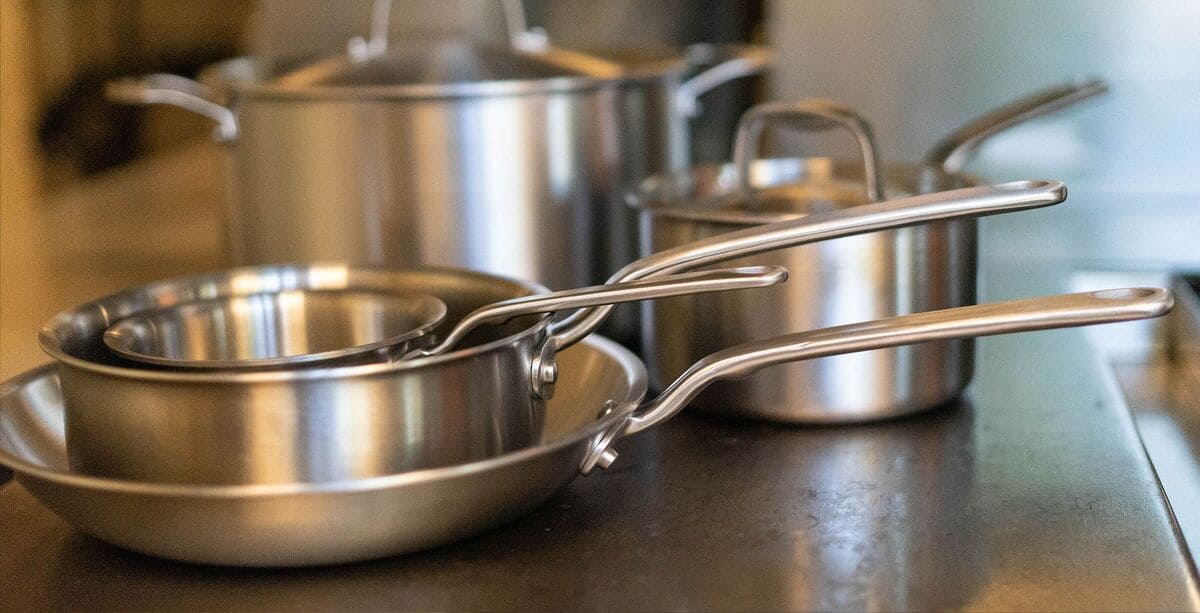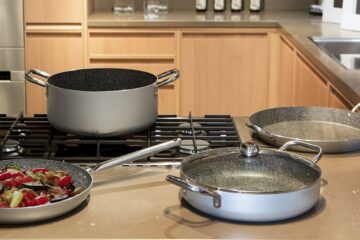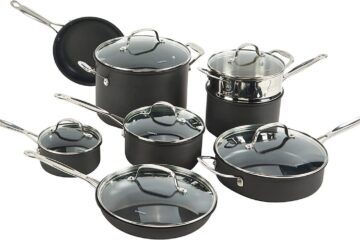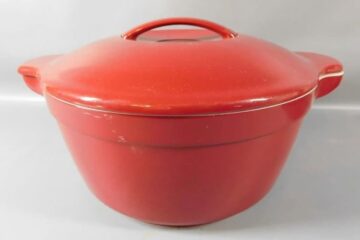Aluminum cookware is a popular choice for many people due to its affordability and durability. However, the safety of cooking with aluminum has been a topic of concern for many years. In Europe, aluminum cookware has been banned in six countries due to potential health risks associated with the metal.
The ban on aluminum cookware in Europe is due to the fact that when heated to high temperatures, aluminum can melt and leach chemicals into the food being cooked. This can lead to harmful effects on the body, particularly on the stomach and gastrointestinal parts of the body. The hydroxide produced by heated aluminum has been linked to several dangerous diseases, including stomach ulcers and colitis. As a result, some European countries have chosen to ban the sale of aluminum cookware and utensils altogether.
While aluminum cookware is still widely used in the United States, it is important to be aware of the potential risks associated with this type of cookware. There are many alternative options available, including glass, stainless steel, modern enamel, and cast-iron cookware. By understanding the potential risks associated with aluminum cookware, individuals can make informed decisions about the types of cookware they use in their homes.
The Regulation of Aluminum Cookware in Europe
The European Union’s Regulation on Aluminum Cookware
The European Union has set limits on the amount of aluminum that can be present in cookware. The limit is 5 milligrams per square centimeter of cookware surface area. This regulation is in place to protect public health, as aluminum can leach into food when it is heated. The regulation also applies to aluminum foil used for cooking.
In addition, the European Union requires that all cookware sold in the EU must be labeled with the materials it is made of. This allows consumers to make informed decisions about the cookware they purchase.
The Member States’ Regulations on Aluminum Cookware
Several member states of the European Union have their own regulations on aluminum cookware. For example, in France, the use of aluminum foil in catering establishments is banned due to its environmental impact. In Germany, there are restrictions on the use of aluminum in food packaging.
Some member states have gone further than the EU regulations and banned the use of aluminum cookware altogether. Six countries, including Denmark and Belgium, have banned the sale of aluminum cookware due to health concerns.
It is important to note that while some member states have stricter regulations than others, all member states must comply with the EU regulations on aluminum cookware.
Potential Risks of Aluminum Cookware
The Health Risks of Aluminum Cookware
Aluminum cookware has been a topic of concern regarding its potential health risks. When aluminum is heated to high temperatures, it can leach into food and cause harm to human health. According to a study published in the Journal of Environmental Sciences, locally-made aluminum cookware is a potential source of lead exposure that has largely been overlooked. This cookware is widely used throughout the developing world. The study found that 15 out of 42 tested aluminum cookware items released ≥1 microgram of lead per serving (250mL) when tested by boiling with dilute acetic acid for 2h. One pot, from Viet Nam, released 33, 1126 and 1426 micrograms per serving of lead, which is a significant amount.
Aluminum has also been linked to Alzheimer’s disease, although the evidence is not conclusive. The Alzheimer’s Association states that “studies have failed to confirm any role for aluminum in causing Alzheimer’s.” However, they also state that “studies have found increased levels of aluminum in the brains of people with Alzheimer’s.”
The Environmental Risks of Aluminum Cookware
The production of aluminum cookware can have negative environmental impacts. The process of mining bauxite, the primary raw material used to make aluminum, can lead to deforestation, soil erosion, and loss of biodiversity. The refining process of bauxite into aluminum requires a significant amount of energy and emits greenhouse gases. In addition, the disposal of aluminum cookware can contribute to landfill waste, which can take hundreds of years to decompose.
While aluminum cookware is not banned in Europe, some countries have restricted its use. In Germany, for example, there is a limit of 0.6 milligrams of aluminum per liter of food, and in France, there is a limit of 5 milligrams per kilogram of food. These limits are in place to protect human health from potential harm caused by aluminum leaching into food during cooking.
Alternatives to Aluminum Cookware
When it comes to cookware, there are several alternatives to aluminum that are available in Europe. Here are some of the most popular options:
Stainless Steel Cookware
Stainless steel cookware is a popular alternative to aluminum cookware. It is durable, easy to clean, and does not react with acidic foods. Stainless steel cookware is also non-reactive, meaning it will not leach chemicals into your food. It is a bit more expensive than aluminum cookware, but it is a good investment for those who are looking for a long-term solution.
Cast Iron Cookware
Cast iron cookware is another popular alternative to aluminum cookware. It is durable, heats evenly, and can be used on the stovetop or in the oven. Cast iron cookware is also non-reactive, meaning it will not leach chemicals into your food. It does require some maintenance, such as seasoning and proper cleaning, but it is a great option for those who want a versatile and long-lasting product.
Copper Cookware
Copper cookware is a high-end alternative to aluminum cookware. It is an excellent conductor of heat, which means it heats up quickly and evenly. Copper cookware is also durable and has a beautiful appearance. However, it is more expensive than other types of cookware, and it requires a bit of maintenance to keep it looking its best.
Conclusion
In conclusion, it is clear that aluminum cookware is banned in six European countries due to the potential health risks associated with its use. Recent studies have found that when aluminum is heated to high temperatures, it can melt and leach chemicals into food, which can be harmful to human health. As a result, many European countries have taken steps to protect their citizens by banning the use of aluminum cookware.
Despite the ban, there are still many people who continue to use aluminum cookware in Europe and around the world. However, it is important to note that there are many other safe and effective alternatives available, including stainless steel, cast iron, and ceramic cookware.
It is also worth noting that the ban on aluminum cookware in Europe does not extend to aluminum foil or other aluminum products. While there are some restrictions on the use of aluminum foil in certain countries, it remains a common material used in food packaging, cooking, and even some medical applications.
Overall, while the ban on aluminum cookware in Europe may seem extreme to some, it is important to remember that it is based on scientific evidence and a desire to protect public health. As such, it is always a good idea to consider the potential health risks associated with any cookware before making a purchase and to choose the safest and most effective option available.



